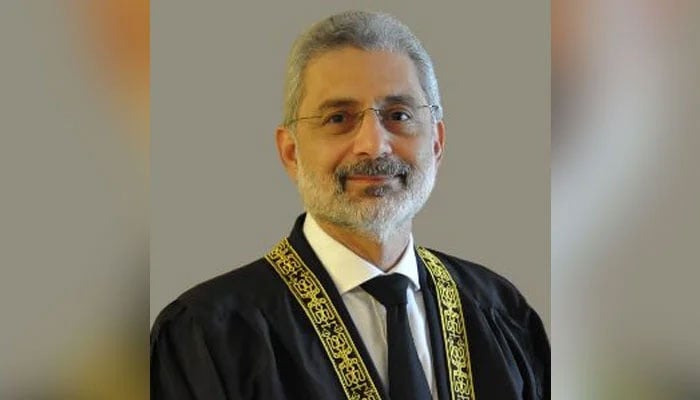CJP calls for 'change in state's mindset' on enforced disappearances
Top judge asks government to submit written assurance that there will be no more enforced disappearances
ISLAMABAD: In a scathing criticism of the approach to the issue of enforced disappearances, Chief Justice of Pakistan (CJP) Qazi Faez Isa Wednesday called on the state to “change its mindset” on the prevalent issue.
The CJP’s remarks came as he led the hearing conducted by a three-member Supreme Court bench comprising Justice Muhammad Ali Mazhar and Justice Musarrat, in response to multiple petitions filed by Barrister Aitzaz Ahsan and others on the issue of enforced disappearances.
Noting that the country has been “fractured” by its people, the chief justice stressed that court verdicts alone were not enough to end the practice of enforced disappearance.
During the hearing, the top judge asked the federal government to give in writing that there would be no more enforced disappearances in the country.
“We do not want a statement from any section officer. The Government of Pakistan should give us in writing that no one will be illegally disappeared anymore,” the CJP said during a hearing of the case.
Aitzaz had prayed the court to declare that enforced disappearances are violative of Articles 4, 9, 10, 14, 19, and 25 of the Constitution besides declaring that the Commission of Inquiry on Enforced Disappearances does not adequately comply with legal and international standards.
Similarly, he asked the apex court to set up an effective and purposeful commission.
He prayed the apex court that the commission should be headed by a judge of the Supreme Court while members of the commission should be the Supreme Court Bar Association president, Pakistan Bar Council vice chairman, Lahore, Sindh, Peshawar, Quetta Bar Association heads, Human Rights Commission of Pakistan chairman, National Commission on Status of Women chairperson, Inter-Services Intelligence (ISI) Director General, Intelligence Bureau (IB) additional director general and Pakistan Federal Union of Journalists president.
At the outset of the hearing, Ahsan’s counsel Shoaib Shaheen cited the Supreme Court’s verdict on the 2017 Faziabad sit-in.
The CJP inquired how the Faizabad sit-in verdict is related to enforced disappearances. Advocate Shaheen maintained that the court has mentioned the role of intelligence agencies in the verdict.
At this, the CJP asked Shaheen to explain the part of the Faizabad sit-in decision that applied to the participants of the Baloch protesters protesting against enforced disappearances.
The counsel replied that the Faizabad verdict stated that peaceful protest is the right of every citizen and called for action against those who resorted to violence.
“I am surprised that you are referring to the Faizabad dharna verdict,” the CJP remarked.
Advocate Shaheen said he had been always referring to the Faizabad verdict. “If the Faizabad sit-in decision had been followed so such circumstances would not have happened today,” he added.
The top court adjourned the hearing of the case till January 9.
-
Security forces gun down 30 terrorists in multiple IBOs in KP: ISPR
-
MQM-P calls for new province in Sindh
-
US report validates Pakistan military edge over India: PM
-
Banned TTP poses serious threat to Pakistan security: UNSC panel
-
CM Afridi clarifies remarks on by-poll after ECP requests army deployment
-
Dubai sees 3.2m Pakistani passengers in 2025 as airport sets new milestone
-
Security forces kill 23 Indian proxy terrorists in KP's Kurram
-
Pakistan to construct island to boost oil exploration: report












